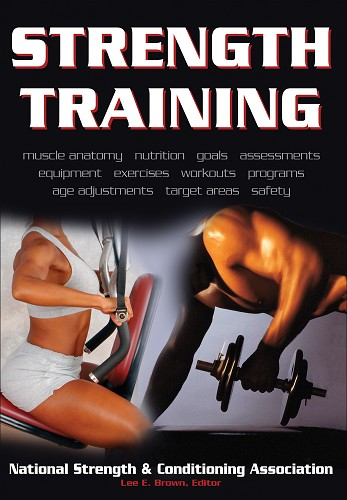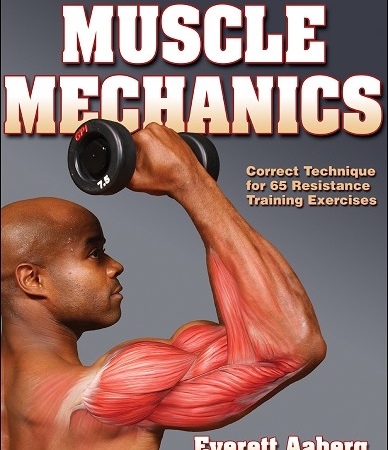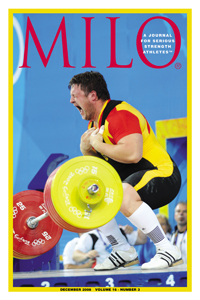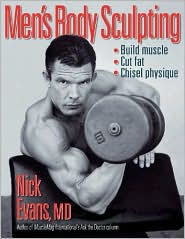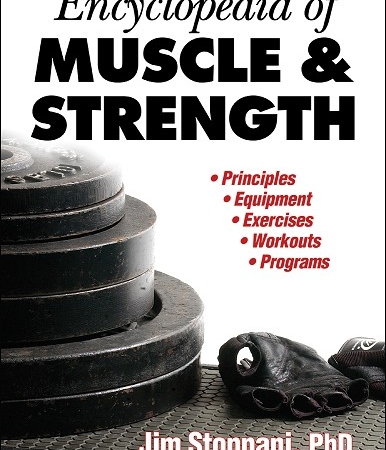Description
Om boken:
368pp
Paperback
Full color
Millions of people want to add muscle, get stronger, and look fit as a result. But when they look for expert guidance, they face a sea of self-proclaimed fitness gurus who say they have a can’t-miss program for fast and easy results. So where do you look for solid, no-nonsense advice you can trust from true experts in the strength training field? Inside this book!
Written by a team of experts chosen by the National Strength and Conditioning Association (NSCA), Strength Training combines the most valuable information with the best instruction for proven results:
- Increasing metabolic rate to burn more calories more efficiently
- Improving bone density to help combat osteoporosis
- Increasing muscle mass as well as strength, power, and endurance
- Preventing injuries
- Improving balance, flexibility, mobility, and stability
- Reducing back and arthritic pain
- Decreasing cholesterol and blood pressure to lessen the risk of coronary disease
The NSCA is the worldwide authority in the field of strength and conditioning, serving 33,000 members from the sport science, athletic, allied health, and fitness industries. Now, the proven techniques developed and honed by these leading authorities are available to you!
Whether you’re launching a lifting program or fine-tuning a serious fitness regimen, Strength Training will fill any knowledge void and correct misconceptions to ensure proper technique, safety, and progressions. Multiple program options and applications to machines, free weights, and other apparatuses provide the flexibility to tailor your training to personal preferences and special needs.
About the Editor
Lee E. Brown, EdD, CSCS*D, FNSCA, is a certified strength and conditioning specialist (CSCS) through the National Strength and Conditioning Association (NSCA) and the president of the NSCA (2006-2009). Brown holds both a master’s degree in exercise science and a doctorate in educational leadership from Florida Atlantic University. He has published more than 75 articles, books, and book chapters on strength and conditioning. Formerly a high school physical education teacher and coach of many sports, Brown is now an associate professor of kinesiology in the department of kinesiology at California State University at Fullerton.
About the NSCA
Founded in 1978, the National Strength and Conditioning Association (NSCA) is an international nonprofit educational association that serves 33,000 members in 56 countries. Drawing on its vast network of members, the NSCA develops and presents the most advanced information regarding strength training and conditioning practices, injury prevention, and research findings.
Unlike any other organization, the NSCA brings together a diverse group of professionals from the sport science, athletic, allied health, and fitness industries. By working to find practical applications for new research findings in the strength and conditioning field, the association fosters the development of strength training and conditioning as a discipline and as a profession.
About the Contributors
Michael Barnes, MEd, CSCS*D, NSCA-CPT, earned his master’s degree in human performance from Auburn University. He is currently the education director for the National Strength and Conditioning Association (NSCA) and is an NSCA-certified strength and conditioning specialist and an NSCA-certified personal trainer. Previously, Barnes worked as a strength and conditioning coach at the Division I collegiate level and for USA Rugby, and he was the strength development coordinator for the San Francisco 49ers for seven years. Barnes is a popular national speaker on strength and conditioning and has authored numerous publications.
Sagir G. Bera, MS, ATC, CSCS, is pursuing a career in medicine while teaching physics, mathematics, and critical thinking for Princeton Review. He is a certified athletic trainer and NSCA-certified strength and conditioning specialist. He obtained his master’s degree in kinesiology from California State University at Fullerton, where he studied the effects of high-velocity resistance training.
Keith E. Cinea, MA, CSCS*D, NSCA-CPT*D, earned his bachelor’s and master’s degrees from the University of Northern Colorado. Currently he is the senior education coordinator for the National Strength and Conditioning Association, where he works as the editor of the NSCA’s Performance Training Journal and editorial assistant for the Strength and Conditioning Journal. Before taking this position, he was the strength training coordinator for the YMCA of Metro Denver downtown branch and worked as an adjunct faculty member at Front Range Community College in Westminster, Colorado. In addition, Cinea currently serves on the advisor board for Maximum Fitness.
Avery Faigenbaum, EdD, CSCS, FACSM, is an associate professor in the department of health and exercise science at the College of New Jersey. He is a fellow of the American College of Sports Medicine and served as vice president of the National Strength and Conditioning Association. He is a leading researcher and practitioner in the area of strength training and has authored five books and more than 100 articles on fitness and conditioning. Faigenbaum resides in Newtown, Pennsylvania.
Brian W. Findley, MEd, CSCS*D, is a professor and department chair of health and wellness at Palm Beach Community College in Boca Raton, Florida. An NSCA-certified strength and conditioning specialist, Findley earned his MEd in exercise science and wellness education and is pursing his PhD in educational leadership, both from Florida Atlantic University. His research interests include occupational physiology and rehabilitative strength training. Findley resides in Royal Palm Beach, Florida.
Steven J. Fleck, PhD, CSCS, is currently professor and chair of the sport science department at Colorado College in Colorado Springs. Dr. Fleck’s main research interests relate to physiological adaptations to resistance training and using sport science information to optimize the design of resistance training programs. He is an internationally known scientist and author in the area of resistance training and has authored numerous research articles as well as several books.
Maren S. Fragala, MS, is currently a doctoral fellow in the department of kinesiology working in the Human Performance Laboratory at the University of Connecticut. Fragala earned her master’s degree in exercise science from the University of Massachusetts at Amherst and returned to graduate school from a research position at the Harvard School of Public Health in Boston. Her research interests are in the area of exercise endocrinology.
Disa L. Hatfield, MA, is currently a doctoral fellow in the department of kinesiology working in the Human Performance Laboratory at the University of Connecticut at Storrs, where she earned a master’s degree in exercise physiology. Hatfield also has an additional master’s degree in health psychology from Antioch University in Santa Barbara. Her major focus of research is exercise endocrinology and resistance training.
Jay Hoffman, PhD, FACSM, CSCS*D, is the chair of the department of health and exercise science at the College of New Jersey. He holds the rank of full professor. Dr. Hoffman has served on the board of directors of the NSCA and served as vice president of that organization. He has published more than 80 articles and chapters in peer-reviewed journals. His books include Physiological Aspects of Sport Training and Performance; Norms for Fitness, Performance, and Health (Human Kinetics 2002, 2006); and most recently, Practical Guide to Designing Resistance Training Programs (Coaches Choice, 2006).
William J. Kraemer, PhD, CSCS, is a full professor in the department of kinesiology in the Neag School of Education working in the Human Performance Laboratory at the University of Connecticut at Storrs. He also holds and an appointment as a full professor in the department of physiology and neurobiology. In addition, Kraemer has an appointment as a full professor of medicine at the UCONN Health Center and School of Medicine. He has published more than 300 scientific manuscripts in the areas of exercise endocrinology, sports medicine, nutritional supplements, and resistance training.
Daniel P. Murray, MS, PT, CSCS, is a physical therapist specializing in the treatment of orthopedic and sports-related injuries. He is an adjunct faculty member of the physical therapy department at Northeastern University and works in private practice in Boston. He obtained his master’s degree in kinesiology from California State University at Fullerton, where he studied the effects of high-velocity resistance training.
Barry A. Spiering, MS, CSCS, is a doctoral fellow in the department of kinesiology working in the Human Performance Laboratory at the University of Connecticut at Storrs. He has also worked as a research assistant in the sports physiology division at the U.S. Olympic Committee’s Olympic Training Center in Lake Placid. His research interests are in the areas of exercise endocrinology and the molecular biology of resistance exercise and training. Spiering earned a master’s degree from Ithaca College.
Jakob L. Vingren, MS, is a doctoral fellow in the Human Performance Laboratory, Department of Kinesiology at the University of Connecticut at Storrs. He earned a master of science degree in kinesiology from the University of North Texas. His major research interests are in the areas of exercise endocrinology and resistance training physiology.
Jeff S. Volek, PhD, RD, is an assistant professor in the department of kinesiology with an adjunct appointment in the nutritional sciences at the University of Connecticut at Storrs. Volek is also a registered dietitian and has conducted several prospective research studies investigating a variety of dietary and exercise interventions in the area of diabetes, cardiovascular disease, and sports performance. He has authored and coauthored more than 100 scientific manuscripts as well as several book chapters, conference proceedings, technical reports, and editorials.
Table of Contents
Part I The Origin of Strength
Chapter 1. Muscle Anatomy 101
Chapter 2. How Muscle Grows
Chapter 3. Types of Muscle Training
Chapter 4. Nutrition for Muscle Development
Part II Resistance Training Guidelines
Chapter 5. Strength Assessment
Chapter 6. Types of Strength and Power Exercises
Chapter 7. Workout Schedule and Rest
Chapter 8. Safety, Soreness, and Injury
Part III Exercise Technique
Chapter 9. Upper Body Exercises
Chapter 10. Lower Body Exercises
Chapter 11. Torso Exercises
Chapter 12. Explosive Movements
Part IV Sample Programs
Chapter 13 Beginner Programs
Chapter 14 Intermediate Programs
Chapter 15 Advanced Programs
Chapter 16 Youth Programs
Chapter 17 Senior Programs
Words of Praise
“The NSCA has created a comprehensive training manual from the top experts in the field. The basics of muscular function are fully covered, and exercise techniques are presented in impeccable detail throughout the book. This is an essential reference for individuals of all training levels, novice to advanced.”
Joe Wuebben, Senior Editor,
Muscle & Fitness magazine
“Strength Training packs decades of material into a thorough, concise resource that every coach, trainer, and fitness professional should have in their active library. Covering all the key topics–muscle anatomy/physiology, nutrition, training adaptations and modalities, assessment, types of strength and power training, technique, and sample programs–this book is an outstanding comprehensive and credible compilation of current knowledge in our field.”
Gina Lombardi, NSCA-CPT
Health magazine columnist
2003 NSCA Personal Trainer of the Year

